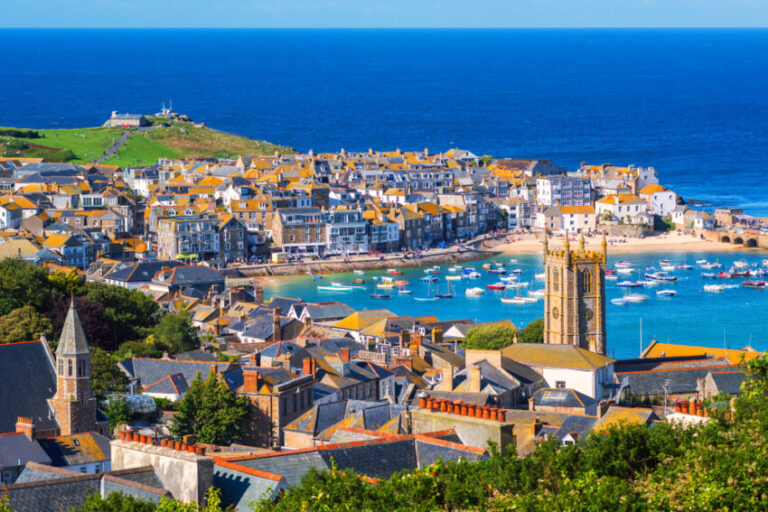[ad_1]
Cornish second home owners are set to pay double in council tax after a proposal which would see the local authority granted powers to raise more money from out-of-towners.
Currently, there is a loophole which allows some second home owners to claim business rates relief and avoid paying council tax altogether.
But the new bid would also see councils able to charge a 100 per cent council tax premium on residents who leave their properties empty for one year or more.
It is estimated that there are more than 13,000 properties in Cornwall classed as second homes on the council tax system — one of the highest levels in the country.
But both proposals were agreed to in principle by Cornwall council’s scrutiny committee on Tuesday and they are now urging the leader of the council to write to the secretary of state asking that all English local authorities have the ability to raise council tax on second homes to even three times the normal rate.
The move followed a request by Julian German, an independent councillor and former leader of Cornwall council, who wants to bring England in line with Wales.
The Welsh government introduced a law this year that allows local authorities to set council tax premiums of up to 300 per cent on second homes and long-empty properties.
Last week it was announced that the county of Gwynedd, an area of Wales widely known for its high tourism numbers, was set to bring in a significant increase to council tax bills for people who are not permanent residents.
Property owners were told they face paying 250 per cent of their council tax bill as the local council introduces a 150 per cent increase on top of their full council tax in a clampdown on second homes in one of Britain’s most scenic areas.
The change could introduce Gwynedd as one of the first Welsh counties to make use of new council tax authorities.
German told The Times: ‘If the Westminster government wants to devolve the ability for councils to raise council tax on second homes then why put a cap on it at 100 per cent; why not trust local government to decide what is right for them, be that 150 per cent or 400 per cent?’
The new proposals are subject to the government’s Levelling-up and Regeneration Bill receiving royal assent.
The bill gives local authorities powers to double council tax on second homes and is expected to be made law in time to apply from April 2024.
Under additional changes which will aim to close the loophole which has allowed some second homeowners avoid paying tax, to come into force in April 2023, second homeowners will have to provide hard evidence that their property is let out to holidaymakers in order to qualify for business rates.
However, if a property owner can prove that their property has been let for at least 70 days a year and has a rateable value of less than £12,000 then they can still qualify for business rates relief and avoid paying council tax.
When the bill does pass, plenty of councils are expected to capitalise on the new taxing opportunity.
North Yorkshire county council for example – which has the highest concentration of second homes in England – became the first English council last month to pass a measure committing itself to doubling council tax bills on second homes.
Currently, Cornwall can double council tax only on homes that have been empty for two years or more.
It charges a 200 per cent tax on homes left empty for more than five years and 300 per cent for those empty for more than ten years.
A report to the committee estimated that doubling the rates of council tax on all second homes could generate an extra £27 million in revenue for the authority.
According to the report, there are more than 13,000 properties in Cornwall classed as second homes on the council tax system — one of the highest levels in the country.
‘Second home ownership within Cornwall is significant and is recognised to have a negative impact in terms of the supply of homes available to meet local housing need,’ the report said.
According to the report, 722 properties are being charged a 100 per cent premium for being empty for more than two years, generating £854,000.
Statistics reveal that although Cornwall has just one percent of England’s population, as of last year, it had 17 per cent of the country’s second homes.
Celebrity chef Gordon Ramsay own three properties in Cornwall although he is not thought to rent them out, including a £6million mansion in the seaside village of Rock
Locals have asked questions about affordability in recent years. House prices in Cornwall are some of the highest in the country, which has angered locals who say they cannot afford homes there. The resort of Megavissey boasts typical property prices of £300,000 – 20 times the average local salary.
A host of famous faces are also homeowners in the county – although they are not believed to rent their properties out: Dame Judi Dench owns a house near St Ives, while celebrity chef Gordon Ramsay owns three properties – including a £6million mansion in the fishing village of Rock.
TV hosts Richard Madeley and Judy Finnegan have owned Steward House at Talland Bay, near Polperro, since 1998.
Rebecca Hemingway, from Fowey Folk Museum, said: ‘There’s nobody with a view of the sea that’s local — maybe one.
‘It’s too late to do anything about the second homes situation now — it would be nice for the community if there were more affordable homes.
‘There’s a handful at the top, but not enough.’
[ad_2]
Source link























0 Comments